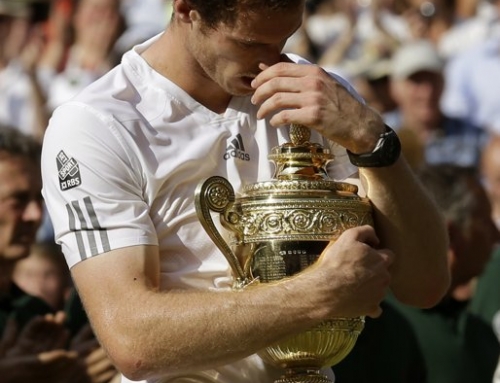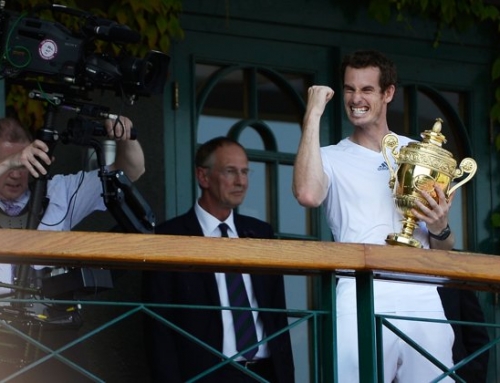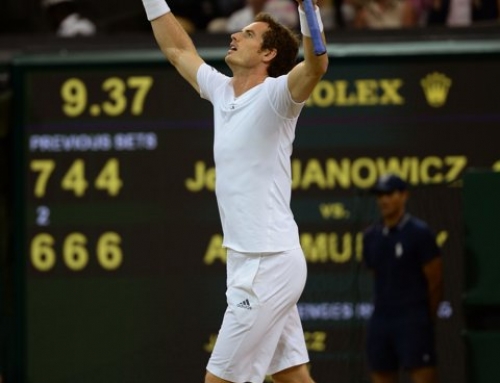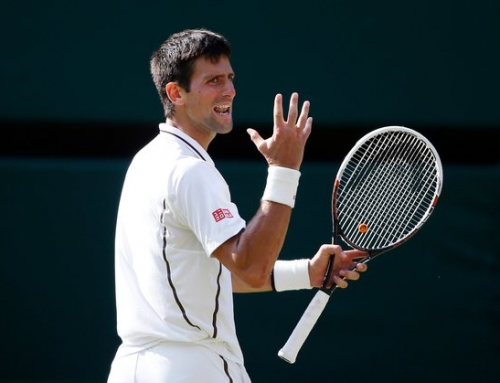 Today, the Americans played. On court today were Brian Baker, Andy Roddick, Mardy Fish, and Sam Querrey.
Today, the Americans played. On court today were Brian Baker, Andy Roddick, Mardy Fish, and Sam Querrey.
But before we start, the upset of the tournament has, alas, gone down. Lukas Rosol, who showed no nerves, in a boldly played fifth set, and took the number two seed and ostensibly, the favorite, out, found himself back to looking ordinary, playing outdoors against Phillipp Kohlschreiber, who, by the way, was the last guy to beat Nadal (arguably, in a match Nadal tanked). Rosol dropped the first two sets easily before pushing the third set into the tiebreak. Rosol was down in the tiebreak, but managed to claw to get it even, before dropping the tiebreak and the match.
With that easy loss, one has to wonder whether Rosol simply zoned out or whether Nadal was not playing his best and only made Rosol look good. One can’t really argue with the numbers which showed Rosol clocking groundstrokes at 90 mph a good 15 mph faster than, say, Ferrer.
Now back to the Americans.
Back when Kim Clijsters and Justine Henin came back from retirement and Clijsters won a Slam right off the bat, and Henin reach the finals of the Slams, critics of the women’s game pointed out how, only in the women’s game, could you leave the game for two years, and come back ready to win the Slam.
But consider Brian Baker who has spent around 6 years away from the game, was not really at the top when injury forced him to numerous surgeries. Sure, Baker was one of the top juniors of his day, not the best, but right up there with them. But there’s been plenty of juniors, say, Grigor Dimitrov, who have had even better success, but have not been able to play at Baker’s level.
Baker’s miracle run may have occurred a year ago, when he entered a Futures event in Pennsylvania and won, and later in the year when he played the Knoxville Challenger, a tournament he had to qualify for and made a run all the way to the finals where he lost to Jesse Levine.
He had been out of the tournament scene so long that victories at the lowest rungs of the ATP tour had to give the Nashville native hope that he could come back.
Baker played more of a full schedule in 2012, playing in a series of Futures. Futures are the lowest rung. You can earn ATP points playing futures, but the win/loss record is not part of your official record. You can play 100 future matches, but your official ATP record for the eyar would be 0-0. The Futures, in a way, are so insignificant that their names are designated mostly by number and location, thus F1, F2, F3 in the United States, their locations not even published at the official ATP site.
Baker won an event merely called F3 back in January. He won F8 back in March. In April, he played Sarasota, a Challenger event. He beat American Ryan Sweeting, but lost, in 3 sets, to a Sam Querrey, working his way back up the ranks. He then won Savannah. The results from Sarasota and Savannah were critical.
Here’s where it’s worth explaining a deal that three of the Slams have made with each other. The French, Australian, and US Open have made the following deal: each Slam gives out 8 wildcards at the discretion of the hosting Slam. Normally, these are given to up-and-coming players of the country or a player that may have been injured or been a little older. Typically, the ranks are so low that they are quickly eliminated in the main draw. Occasionally, Slams make good decisions and give wildcards to players from a different country. Thus, Wimbledon famously gave Goran Ivanisevic a wildcard back in 2001 and went on to become the first wildcard ever to have won Wimbledon.
In the last few years, these three countries now award two wildcards to the other two nations. Thus, the Australian Open gives a wildcard to an American and a wildcard to a Frenchman (or woman). It’s up to those countries to decide how to award that wildcard. The country could simply pick a player, and they would be the wildcard. The US used to select this wildcard by hosting an 8-man tournament about 2-3 weeks prior to the Slam. The winner would get the wildcard.
However, famously, Donald Young, who had won a Challenger prior to a Slam, but lost in this special qualifying event, and tweeted how unfair this was, may have pushed the change to use Challenger events as the means to select the wildcard.
Because Baker won Savannah and did reasonably well at Sarasota, he was the American wildcard for the French Open.
Baker then headed to Nice where he had enough points to play in qualifiers. There, he played 8 matches in a little over a week, beating players like Stakhovsky, Monfils (who was admittedly injured, and hasn’t played since then), Kukushkin, and Davydenko, before falling to defending champ, Nicolas Almagro.
It seemed the French Open in its infinite wisdom gave Baker a wildcard. But Baker had earned that wildcard. He won his opening round, but lost in a long match to Gilles Simon, one where he admitted that his fitness was not exactly world-class.
Baker went to Queen’s to qualify, but lost to hard hitting Korolev. Wimbledon did not give Baker a wildcard, so he went through qualies too. He won the first two rounds easily, but was taken to a fourth set in the last round of qualifying.
In a way, Baker had as good a draw as he could hope for. His opening round was against Rui Machado, a player that’s not even likely to make most main draws, and a match he won easily. He might have played the seeded Feliciano Lopez who had a huge run last year at Wimbledon, but was eliminated by another lefty, in Jarkko Nieminen. Who knew why Nieminen lost so tamely to Baker, but he did.
In the third round, where he would have played Alexandr Dolgopolov, but instead, played Benoit Paire, Baker split the first two sets. However, he ran away with the next two sets, and has now reached the fourth round where he’ll finally play a seed in Phillipp Kohlschreiber, the hard hitting German player.
Kohlschreiber has played reasonably well on grass reaching the semis at Halle, beating Nadal en route, and reaching the quarters at Eastbourne. Still, ranked number 30 in the world, there might be chances for Baker to win this one too. Of all the seeded players, he barely made it as a seed. Even so, it will be a step up in competition.
Andy Roddick had been having a lousy year this year. His ranking was around 30, so he lucky to still be seeded. Roddick had been on a losing streak, not having won a match since Miami. Due to injury, his quality of play had been shaky during the clay court season. Then, he lost in the opening round at Queen’s to Edouard Roger-Vasselin (whose father also played pro tennis). Feeling match-shy, Roddick begged for a wildcard to Eastbourne, a tournament that generally has a weaker draw, but the kind of tournament Roddick wanted to regain his confidence which he did by winning.
Roddick had, if you can imagine, a nicer draw than Baker. His opening round was against Jamie Baker, a British player. It’s hard to even say who the second ranked Brit is after Murray, so far is that person below Murray. That was an easy win. Roddick then played the quick, but not hard hitting, Bjorn Phau, in the subsequent round. Again, a straight-forward win.
This put him against David Ferrer. In any other year, this would be a matchup that Roddick would like. But Roddick had to be concerned. Ferrer had come off his best French Open, reaching the semifinals. OK, so clay isn’t grass. But you know, the same week Roddick was winning Eastbourne? Ferrer was winning a grass event in the Netherlands. So Ferrer was having as good a grasscourt tuneup as he could hope for.
Ferrer played Jamaican turned German, Dustin Brown, in the first round, with a straight set win, then played big serving Kenny de Schepper of France, but dispatched him in straight sets.
Ferrer found himself down 4-0 in the first against Andy Roddick as his game seemed a bit off and Roddick had to be pretty happy. He would take the first set, 6-2, but the second set would go to a tiebreak. When Ferrer won that 10-8, it must have deflated Roddick and elevated Ferrer’s game. Ferrer would win the next two sets, 6-4 and 6-3. Roddick had to feel this was as good a chance to beat a top seed on his favorite surface despite not having come in at the top of his game. As he left the court, he waved to the crowd in a wistful manner as if it may be his last. Perhaps the pundits were reading too much into it, but Roddick was a bit sadder than usual.
One can chalk his loss to age, but David Ferrer is actually older than Roddick and has been playing his best tennis the last 3 years. He only has to look at Mardy Fish to see another player that had a late surge (or Jurgen Melzer or Nikolay Davydenko, who, to be fair, have faded some).
Speaking of Mardy Fish, Fish had his own worries. Fish hasn’t played a match since Houston, an event shortly after Miami. He had rapid heartbeat which had lead serious worries about his health and a surgery to correct the problem. Wimbledon was his first tournament back, and he’s had a pretty good ride so far. Fish needed three sets to be Ramirez Hidalgo, then five sets to beat Brit, Jamie Ward, then today, he eked out a straight set win over the rising talent, David Goffin, with two tight tiebreaks in sets 2 and 3.
Cilic looked like he would take out Sam Querrey when he went two sets to love up, but Querrey, who has been trying to get his ranking back up for about a year, Cilic managed to claw his way back to a fifth set. Although it looked like it would be a Isner-Mahut style match, but the difference was that both players were competitive in each other’s serve. The reason Isner-Mahut lasted so long was that neither did a great job on the return game. It’s as if Ivo Karlovic faced his twin. The match might never end.
Cilic had a chance to win when he broke around 6-5, but Querrey played a solid game to break back. I give credit to Querrey for keeping mentally steady for so long. Cilic has played more five setters and won a greater percentage. Much like James Blake, Querrey has struggled in fifth sets, and while he lost this one, he kept mentally focused for the vast majority of the set. The difference was two-fold. Cilic did better on Querrey’s second serve than Querrey did on Cilic’s serve, and Cilic was a touch more aggressive. Querrey was trying to balance getting the ball back and attacking the ball. Cilic had the same problems, but was just a bit better.
Finally, Andy Murray had to play Marcos Baghdatis who has given Murray trouble before. Murray took the first set, 7-5, and was up a break in the second, but eventually lost that set. Baghdatis was up a break, playing a bit erratically, until he settled down enough to break back, and ultimately break again. Because Murray won the third set, 7-5, and there was a 11:00 PM curfew, the sense was the match would have to be called because of the curfew (despite a roof with lights which would, theoretically, allow them to play into the early AM if desired).
Baghdatis complied by playing a relatively sloppy fourth set with Murray cleaning up his play. Murray broke twice, and at 5-1 up, the clock struck 11 PM. Organizers decided to play one more game which Baghdatis complied, and 4 points later, Murray had escaped another tough match.
Tomorrow is the day off when all players rest. On Monday, all singles players will play the round of 16.







![[Wimbledon, QF] Murray scraps out 5-set win over Verdasco to reach semifinals](https://www.essentialtennis.com/wp-content/uploads/2013/07/20130703murray-500x383.jpg)